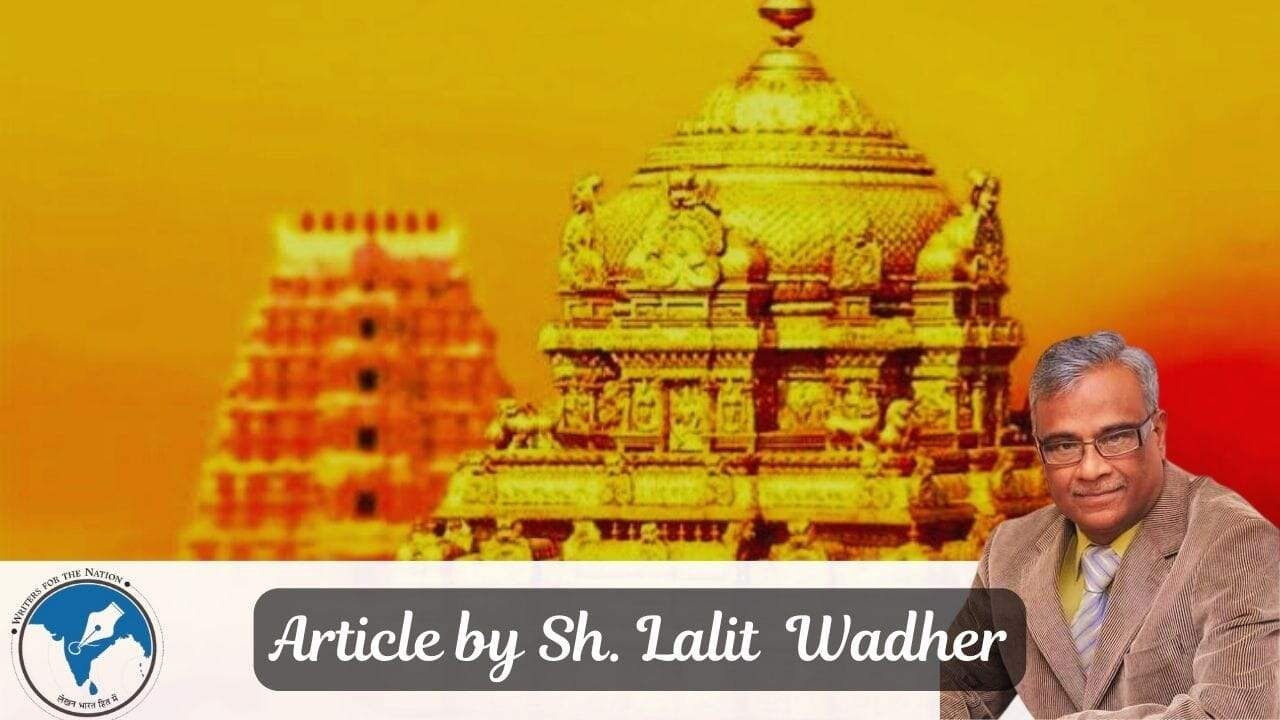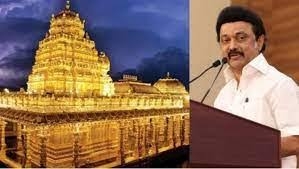CONTROL OF HINDU TEMPLES
It is very tragic that state governments in India barring Uttarakhand exercise control over Hindu temples and levy some portion of donations received by temples. Usually this is 10%. In Tamilnadu the government derives powers though the The Madras Hindu Religious and Charitable Endowments Act, 1951, which came into force from 28th August 1951.

A very disturbing news had come from Tamilnadu in September 23. 5000 crores worth of properties belonging to Hindu temples were looted by the DMK government. The actual word used in the government press release was ‘retriving’. This is highly objectional – calling open loot as retrieving as if Hindu temples owed a debt to the government.
The news article states that the Chief Minister had indulged in praising his government saying that the government was working on the principle of ‘Everything for everybody’. This claim and self praise by DMK needs to be examined critically particularly by all Sanatanis.
First of all this is the same DMK which believes in eradication of Sanatan. This has been publicly stated by no less a person than Udayanidhi, who is a cabinet minister in the state government and is son of the CM. 
Cambridge Dictionary gives meaning of the word eradication as the process of getting rid of something completely or of destroying something. Suitable Hindi phrase for eradication will be samul nash.
Therefore Mr Stalin is not fooling anybody by his sweet words. One part of the statement that the government has looted Rs. 5000 crores is correct because it is on records and can be verified and audited. But the claim of the DMK that it has been used for welfare of people and maintenance of temple is just hogwash.
It is very tragic that state governments in India barring Uttarakhand exercise control over Hindu temples and levy some portion of donations received by temples. Usually this is 10%. In Tamilnadu the government derives powers though the The Madras Hindu Religious and Charitable Endowments Act, 1951, which came into force from 28th August 1951.
Section 76(1) of the said Act envisaged levy of 10%. Other states have similar acts. Now let us revisit article 15 of the Constitution of India - The State shall not discriminate against any citizen on grounds only of religion, race, caste, sex, place of birth or any of them.
Forcing only Hindu temples to part with their assets and revenue is blatantly unconstitutional and has been going on for last 75 years. Other religious places of worship receive such revenue in form of Jakat for Muslims and Tithe for Christians. No government has dared to touch this.
The Supreme court of India, in a 2012 judgement, ordered that Haj subsidy must end by 2022. The Supreme Court found that Hajj by Indian Muslims is funded to a substantial extent by the Indian Government.
So there is a precedent that preferential treatment on the basis of religion is unconstitutional. By applying this case law levy of any kind exclusively on places of worship (temples) of any religion too is unconstitutional.
Uttarakhand government has taken initiative in this direction and repealed an act which gave contol of certain temples to the government. All state governments, particularly BJP ruled states, should pass laws to release Hindu temples from their control.
It is not the case that this is not known to Hindus, political parties or governments. But it begs the question, “what is the reason?” The answer is very simple. Indifference and care less attitude of Hindus. More than half of Hindus who donate to temples may not be knowing that they are subjected to an unconstitutional discrimination.
Enough of this recrimination. Hindus have themselves to blame because they have been silent spectator and even accomplices in this injustice in some cases.
What can be done ?
Let us focus on what can be done now to free our temples from the clutches of communal governments.
- Awareness and Education of donors. Hindu organizations must come forward and display banner/s in front of temples (where temple tax is levied) that 10% of their contribution will be snatched by the government. They will not have any control over how and for whom such amount is spent by the government.
- An appeal may be made (by means of another banner) to make a token donation to the temple and make donations to a better cause like orphanages, hospitals, gaushala etc. which work honestly and transparently.
- A petition should be kept at such temples urging the government/s to repeal this draconian and discriminatory act. Devotees visiting the temple may be requested to sign the petition. Periodically this petition should be submitted to the Government. Table may be manned by two or three volunteers ready to explain the matter if anybody for any explanation.
- RTI should be used extensively. RTI applications should be submitted asking for:
a. What is the amount collected from a specific temple during last year.
b. How this amount was spent?
c. Was the amount spent for welfare of Hindus only or some other community specifically or for the general public?
d. List of such welfare schemes and amount spent on such schemes.
e. RTI applications should be filed with state governments on the above lines in respect of all the temples in the state.
- Andhra Pradesh Government had appointed a non-hindu as the chairman of the TTD (Tirupati) Trust. Similarly Akhilesh Yadav’s samajvadi government had appointed Azam Khan as the chairman of Kumbh Meal Committe. This is like adding insult to injury. Petitions (in hundreds) should be submitted to state governments that till such time the act is repealed a government order should be passed that only Hindus will be appointed to temple trusts.
- Hindu spiritual leaders, Gurujis, sanits, mahants, mathadish, and other such leaders, appear to be indifferent on this count. No one has raised voice against taxing of Hindu temples. If they take up the issue proactively with government, it would surely help in protecting Hindu interests. They wield substantial influence in corridors of power and their influence shall expedite the matter.

Lalit Wadher
Columnist - Writers For The Nation
Retired Banker
Raipur, Chhattisgarh


